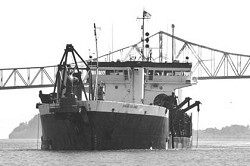forum
library
tutorial
contact

Court Gives Corps OK to Dredge
by StaffThe Daily Astorian, August 24, 2006
|
the film forum library tutorial contact |

|
Court Gives Corps OK to Dredgeby StaffThe Daily Astorian, August 24, 2006 |
 A federal appeals court on Wednesday rejected an attempt by environmentalists to block the dredging of 103 miles of the Columbia River.
A federal appeals court on Wednesday rejected an attempt by environmentalists to block the dredging of 103 miles of the Columbia River.
The work is designed to give new, larger oceangoing vessels access to Portland and other ports, helping them compete for Pacific Rim business.
By the end of 2006, it will be about 40 percent complete and could be finished in two to four years, depending on how fast Congress supplies money, the U.S. Army Corps of Engineers said.
In a 2-1 decision, a panel of the 9th U.S. Circuit Court of Appeals said a lower court judge correctly decided that the Corps had taken the "hard look" that environmental laws require to protect salmon in the river.
The Corps changed its plans to minimize the loss of sediment involved in disposing of it in deep waters off the coast and had done "exhaustive studies over numerous years, soliciting and accommodating input from stakeholders and thoroughly re-analyzing areas of particular concern," Judge Barry Silverman wrote.
The decision called the Corps' measurement of costs and benefits realistic.
"Once again, the courts have agreed with our arguments," said Laura Hicks, project manager for the Corps. "We have nearly two decades worth of work - evaluating this project and ensuring that it complies with all applicable laws - to stand behind."
The dredging project would deepen the Columbia shipping channel from 40 feet to 43 feet from Astoria to Portland-Vancouver, Wash.
Because the new ships require more depth than 40 feet, many must carry light loads if they use the Columbia. Court documents said that restraint now applies to about 70 percent of the Pacific container trade, but the project would reduce that to 30 percent.
Environmentalists objected to the Corps' plan to dump sediment off the continental shelf in the Pacific Ocean, taking it out of the natural system that would replenish beaches in Oregon and Washington state and aggravating the damage coastal erosion does to ecosystems and local economies.
In the court opinion, the dissenter, Judge Betty Fletcher, said the Corps had done suspect analysis of the project's impact on beach erosion and river pollution, and its economic reasoning was flawed.
"The Corps is wont to undervalue costs and overvalue benefits so that it can get on with its mission - constructing water projects," Fletcher wrote.
The suit was brought by Northwest Environmental Advocates in Portland.
In June 2005, U.S. District Judge Ricardo Martinez in Seattle ruled that the government's decisions "were not arbitrary and capricious." The appeals court upheld his decision.
Steve Mashuda, a lawyer for the center, said it had not yet decided whether to make a further appeal.
His colleague, Nina Bell, said the group will continue to monitor the Corps' pledge to conduct the dredging carefully.
Bell, executive director of the Portland-based group, said the central claim in the case challenged the Corps' failure to consider the impacts to on-going erosion of the Oregon and Washington coasts from its plans to dump sand from the River in a deep-water ocean disposal site.
"The strong dissenting opinion recognized that - anyone familiar with the Washington coastline has seen the devastation from past erosion (consequences the Corps admits were caused by its own past bad practices) - but found that the Corps' plans did not account for future damage from channel deepening and other projects.
While the majority decision recognized that using the deep ocean disposal site to full capacity would have "profound" adverse impacts on this coastal erosion, it relied in large part on the Corps' pledge that the agency did not intend "to use the entire capacity of the Deep Water Site," in upholding the Corps' analysis.
"Taking much-needed sand away from the coasts and dumping it in the deep ocean just doesn't make sense and will only worsen the great environmental and economic costs of coastal erosion," said Bell.
"Unfortunately, the Corps continues to ignore this problem in its piecemeal management of the Lower Columbia River. While we had hoped the court would address this problem, we'll continue to work for solutions to the erosion problem and to make sure the Corps lives up to the promises it made to the court."
The cost of the project is estimated at $150 million, $95 million of which will be paid for by the federal government. The states of Oregon and Washington will fund the remainder of the costs.
learn more on topics covered in the film
see the video
read the script
learn the songs
discussion forum
